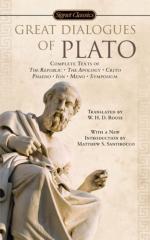
|
| Name: _________________________ | Period: ___________________ |
This quiz consists of 5 multiple choice and 5 short answer questions through Republic: Book II.
Multiple Choice Questions
1. What poet is cited by Cephalus to explain the paradox of old age?
(a) Shakespeare.
(b) Homer.
(c) Petrach.
(d) Pindar.
2. How does Socrates rebut the definition of virtue offered by the poets?
(a) By instructing Meno that it is impossible to have an abstract entity which moves other things but does not move itself.
(b) By showing Meno that all men desire good things, but that not all men are virtuous.
(c) By proving to Meno that there are many commonly held virtues.
(d) By giving Meno a solid definition of virtue.
3. Why does Socrates speak about dogs and other animals to Glaucon?
(a) To establish grounds for a society in which people function like animals in a natural kingdom.
(b) Socrates likes animals more than people.
(c) In order to show, by analogy, that it is difficult albeit not impossible to have people who are both gentle and aggressive.
(d) In hopes of finding the source of virtue.
4. To understand Ion's poetically inspired spirit, Socrates employs a metaphor of which of the following?
(a) A newly born start to explain how small and insignificant our world is in the greater picture.
(b) An eye attempting to see itself, explaining how our mental visions are limited by the bounds of our brain.
(c) A magnet to explain how a poet's inspiration moves from the muse to the audience.
(d) A dying animal to explain how the sole individual is part of a significant collective.
5. When Cephalus tends to his sacrifice, who immediately takes his place in conversation with Socrates?
(a) Thrasymachus.
(b) Polemarchus.
(c) Glaucon.
(d) Aristotle.
Short Answer Questions
1. Describe Meno's appearance and attitude when he meets Socrates.
2. How does Thrasymachus first define justice?
3. Who said the following: "may not the art of which neither teachers nor disciples exist be assumed to be incapable of being taught?"
4. When Meno arrives in Athens, who is accompanying him?
5. Socrates concludes which of the following about virtue?
|
This section contains 420 words (approx. 2 pages at 300 words per page) |

|




